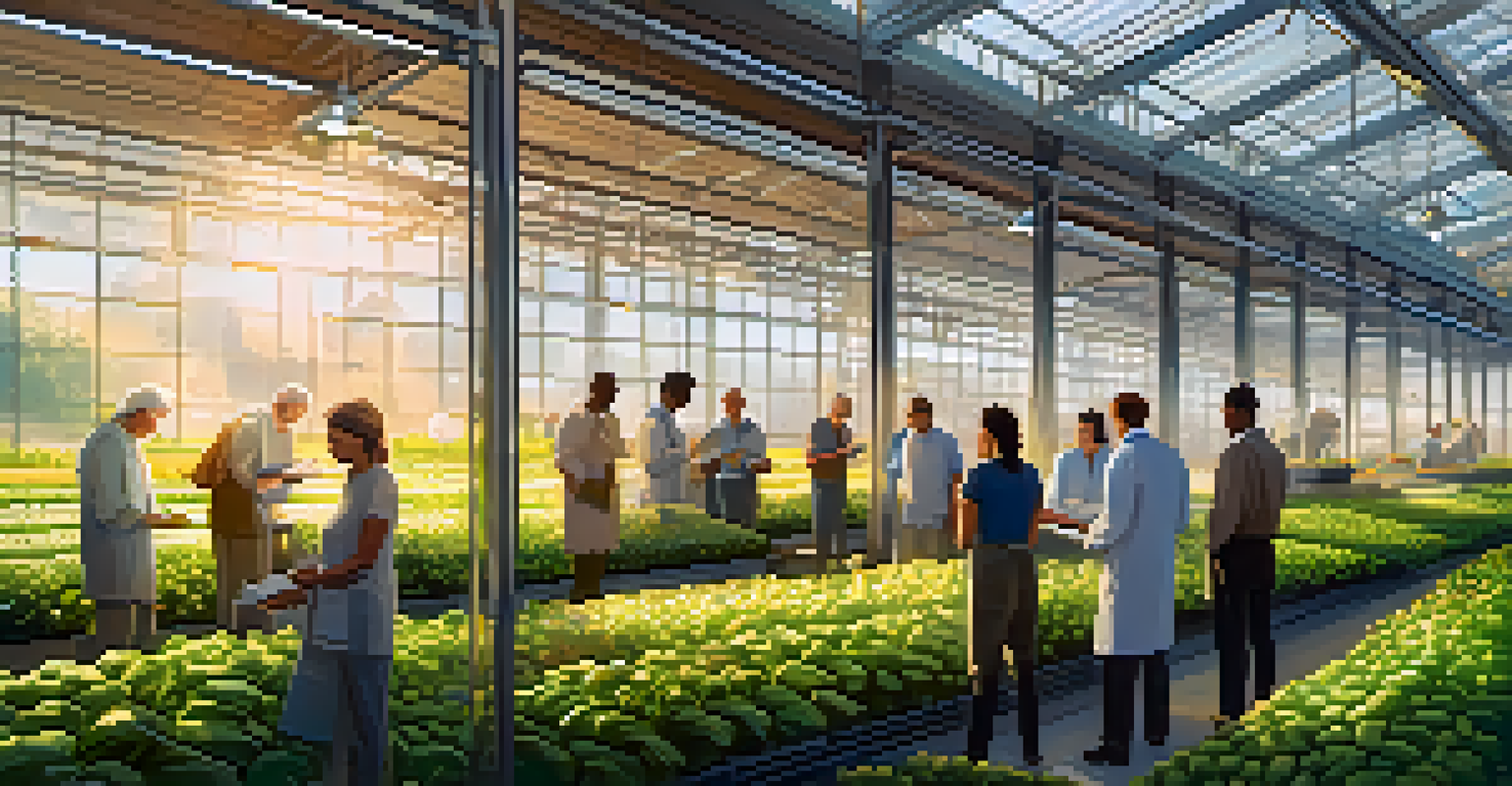Innovations in Plant Breeding: The Role of Biotechnology

Understanding Plant Breeding and Its Importance
Plant breeding is the science of improving crops to enhance yield, disease resistance, and environmental adaptability. It has been essential in feeding a growing global population, ensuring food security, and supporting sustainable agriculture. By combining traditional methods with modern techniques, breeders can develop varieties that thrive in changing climates.
Biotechnology will enable us to feed the world more sustainably, ensuring food security for future generations.
Historically, plant breeding relied on selective breeding and cross-pollination, which could take years or even decades to produce results. Today, innovations like biotechnology allow for faster and more precise improvements. This shift is crucial as we face challenges like climate change and the need for more resilient food sources.
Moreover, the importance of plant breeding extends beyond just food production. It plays a significant role in enhancing the nutritional quality of crops and reducing the use of chemical inputs, which is beneficial for both health and the environment. As the world continues to evolve, so too must our approaches to plant breeding.
The Basics of Biotechnology in Agriculture
Biotechnology in agriculture refers to the use of scientific tools and techniques to modify living organisms, particularly crops, for specific traits. This can involve genetic engineering, where genes from one organism are inserted into another to confer desirable traits, such as pest resistance or drought tolerance. The goal is to create plants that better meet the needs of farmers and consumers.

One of the most well-known examples of agricultural biotechnology is Bt cotton, which has been genetically modified to express a protein that is toxic to specific pests. This has resulted in reduced pesticide use, higher yields, and increased profitability for farmers. Such innovations demonstrate the potential of biotechnology to address agricultural challenges effectively.
Importance of Plant Breeding
Plant breeding enhances crop yield and resilience, ensuring food security and sustainability in agriculture.
However, the use of biotechnology in agriculture is often accompanied by debates regarding safety and ethics. It is essential for consumers and stakeholders to understand the rigorous testing and regulatory processes that ensure these technologies are safe for human consumption and the environment.
CRISPR Technology: A Game-Changer in Plant Breeding
CRISPR (Clustered Regularly Interspaced Short Palindromic Repeats) technology has emerged as a revolutionary tool in plant breeding. It allows scientists to edit specific genes within a plant's DNA with unprecedented precision. This means that rather than introducing foreign genes, researchers can enhance or silence existing traits in a plant, leading to faster and more targeted improvements.
The future of agriculture depends on the innovations we embrace today, particularly in plant breeding and biotechnology.
For instance, scientists have used CRISPR to develop rice varieties that are more resilient to flooding and diseases, directly addressing issues that impact food security. This kind of targeted editing can save time and resources compared to traditional breeding methods, which often rely on trial and error.
Moreover, the implications of CRISPR extend beyond just crop improvement. By allowing for the development of plants that can thrive in diverse conditions, this technology contributes to sustainable agricultural practices and helps mitigate the impacts of climate change.
The Role of Genomics in Enhancing Crop Traits
Genomics, the study of an organism's complete set of DNA, plays a crucial role in plant breeding by providing insights into the genetic makeup of crops. With advancements in sequencing technologies, scientists can identify genes associated with important traits, such as yield, nutritional value, and disease resistance. This information is invaluable for breeders seeking to develop improved varieties.
By leveraging genomic data, breeders can make informed decisions about which plants to cross and which traits to select. This approach not only speeds up the breeding process but also increases the likelihood of success by focusing on specific genetic markers linked to desirable characteristics.
Biotechnology's Role in Agriculture
Biotechnology, including CRISPR and genomics, enables precise modifications in crops, improving traits like pest resistance and drought tolerance.
Furthermore, genomics allows for the identification of genetic diversity within crop species, which is essential for breeding programs. Understanding the genetic variation available helps breeders create varieties that are more adaptable to changing environmental conditions.
Sustainability and Biotechnology: A Perfect Match
Sustainability is a key concern in modern agriculture, and biotechnology offers tools to address this challenge. By developing crops that require fewer inputs, such as water and fertilizers, biotechnology helps reduce the environmental footprint of farming. For example, drought-resistant varieties can thrive with less water, which is increasingly important in regions facing water scarcity.
Additionally, biotechnology can enhance soil health by reducing the need for chemical fertilizers and pesticides. Crops engineered for pest resistance can lower the reliance on chemical treatments, promoting a healthier ecosystem. This shift not only benefits the environment but also contributes to the overall health of consumers.
As consumers become more aware of sustainability issues, the demand for responsibly produced food continues to rise. By integrating biotechnology into plant breeding, farmers can meet this demand while also supporting environmental stewardship and sustainable practices.
Challenges and Controversies Surrounding Biotechnology
Despite the numerous benefits of biotechnology in plant breeding, it is not without its challenges and controversies. Public perception often plays a significant role in the acceptance of genetically modified organisms (GMOs). Many consumers have concerns about food safety and the long-term effects of consuming GMOs, leading to a demand for transparency in labeling.
Additionally, regulatory hurdles can delay the development and commercialization of biotechnologically improved crops. Different countries have varying regulations regarding the approval of GMOs, which can complicate international trade and access to innovative agricultural technologies.
Challenges of GMOs and Ethics
While biotechnology offers benefits, public concerns about safety and ethical issues surrounding GMOs present significant challenges.
Moreover, there are ethical considerations surrounding the use of biotechnology in agriculture. Questions about corporate control over seeds and the impact on smallholder farmers are important discussions that need to take place as we navigate the future of plant breeding.
The Future of Plant Breeding: A Biotechnological Approach
Looking ahead, the future of plant breeding is undoubtedly intertwined with advancements in biotechnology. As technology continues to evolve, we can expect even more precise and efficient methods for developing new crop varieties. Innovations like synthetic biology and advanced gene editing hold the promise of creating crops that can withstand extreme weather and pests while providing better yields.
Moreover, interdisciplinary collaboration will be essential in driving these innovations forward. By bringing together experts in genetics, agriculture, and environmental science, we can tackle complex challenges and develop solutions that benefit both farmers and consumers.

Ultimately, the future of plant breeding will be characterized by a commitment to sustainability and addressing global food security. By harnessing the power of biotechnology, we can create a resilient agricultural system capable of meeting the needs of a growing population while protecting our planet.